Filter by
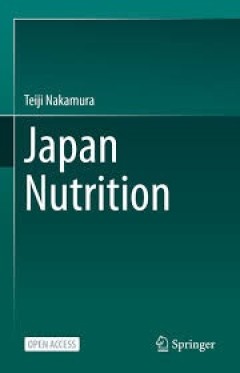
Japan Nutrition
- Edition
- -
- ISBN/ISSN
- 978-981-16-6316-1
- Collation
- -
- Series Title
- -
- Call Number
- -
- Edition
- -
- ISBN/ISSN
- 978-981-16-6316-1
- Collation
- -
- Series Title
- -
- Call Number
- -

Worldwide Perspectives on Geographical Indications = Crossed views between re…
Geographical Indications (GI) are distinctive signs that associate products of quality and reputation with their place or area of production and thereby help identify and distinguish such products on the market. In July 2022, the Food and Agriculture Organization of the United Nations (FAO) and the Centre de coopération internationale en recherche agronomique pour le dével oppement (CIRAD)…
- Edition
- -
- ISBN/ISSN
- 9783031716416
- Collation
- XXII, 394 hlm; ill., lamp.,
- Series Title
- -
- Call Number
- -
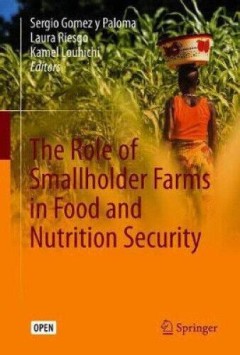
The Role of Smallholder Farms in Food and Nutrition Security
This open access book discusses the current role of smallholders in connection with food security and poverty reduction in developing countries. It addresses the opportunities they enjoy, and the constraints they face, by analysing the availability, access to and utilization of production factors. Due to the relevance of smallholder farms, enhancing their production capacities and economic and …
- Edition
- 1
- ISBN/ISSN
- 9783030421489
- Collation
- XI, 251 hlm; ill., lamp.,
- Series Title
- -
- Call Number
- -

The Potato Crop : Its Agricultural, Nutritional and Social Contribution to Hu…
This book is open access under a CC BY 4.0 license. This book provides a fresh, updated and science-based perspective on the current status and prospects of the diverse array of topics related to the potato, and was written by distinguished scientists with hands-on global experience in research aspects related to potato. The potato is the third most important global food crop in terms of cons…
- Edition
- 1
- ISBN/ISSN
- 9783030286835
- Collation
- XVII, 518 hlm; ill., lamp.,
- Series Title
- -
- Call Number
- -

Live, Die, Buy, Eat
Live, Die, Buy, Eat. These words represent a chain of events which today is disconnected. In the past few years, controversies around meat have arisen around industrialization and globalization of meat production, often pivoting around health, environmental issues, and animal welfare. Although meat increasingly figures as a problem, most consumers’ knowledge of animal husbandry and meat produ…
- Edition
- -
- ISBN/ISSN
- -
- Collation
- -
- Series Title
- -
- Call Number
- -

Carotenoids in Nature : Biosynthesis, Regulation and Function
This comprehensive, edited book explores carotenoids and their important functional roles in yeast, bacteria and plants and a profound exposition on the structures of carotenoid molecules, focusing in the first of three parts on the biosynthesis of carotenoids. The regulation of carotenoid biosynthesis in photosynthesis as well as in plant, fruits, storage roots and algae is central to the seco…
- Edition
- -
- ISBN/ISSN
- 978-3-319-39126-7
- Collation
- -
- Series Title
- -
- Call Number
- 641.3
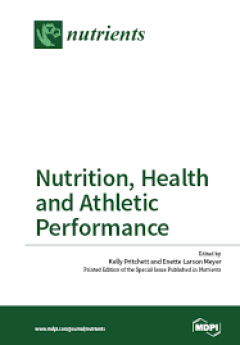
Nutrition, Health and Athletic Performance
Optimal nutrition is fundamental for enhancing training, recovery and performance in sport. Therefore, research has aimed to determine the efficacy of appropriate intake of nutrients, fluids, and supplements and their role in exercise performance. The purpose of this Special Issue entitled “Nutrition, Health and Athletic Performance” is to highlight recent research examining aspects of spor…
- Edition
- -
- ISBN/ISSN
- 978-3-03842-627-1
- Collation
- -
- Series Title
- -
- Call Number
- 572 NUT
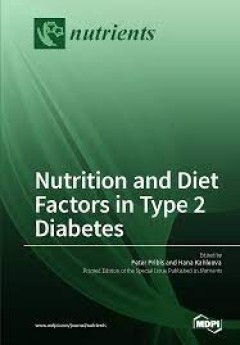
Nutrition and Diet Factors in Type 2 Diabetes
Diabetes mellitus has become a major public health burden. Approximately seven million people develop diabetes in both developed and developing countries every year, with the most dramatic increases occurring in Type 2 Diabetes. Especially alarming, is the rising incidence of Type 2 Diabetes in obese children before puberty.
- Edition
- -
- ISBN/ISSN
- 978-3-03842-915-9
- Collation
- -
- Series Title
- -
- Call Number
- 572 NUT
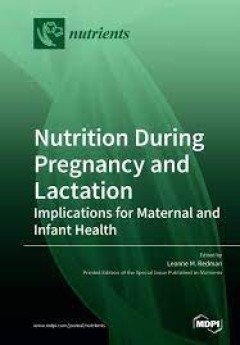
Nutrition During Pregnancy and Lactation : Implications for Maternal and Infa…
Pregnancy is a viewed as a window to future health. With the birth of the developmental origins of human adult disease hypothesis, research and clinical practice has turned its attention to the influence of maternal factors such as health and lifestyle surrounding pregnancy as a means to understand and prevent the inter-generational inheritance of chronic disease susceptibility. Outcomes during…
- Edition
- -
- ISBN/ISSN
- 978-3-03928-055-1
- Collation
- -
- Series Title
- -
- Call Number
- 572 NUT
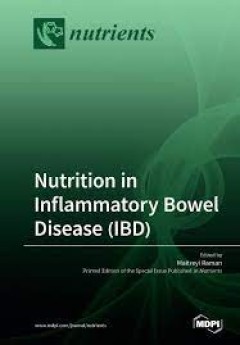
Nutrition in Inflammatory Bowel Disease (IBD)
The purpose of this Special Issue “Nutrition in Inflammatory Bowel Disease (IBD)” is to increase knowledge regarding the role of dietary composition and effects in IBD, describing the prevalence of malnutrition in IBD and the effect on clinical outcomes, discussing methods of nutrition risk screening and assessment in IBD, and reviewing mechanisms through which diet and dietary components m…
- Edition
- -
- ISBN/ISSN
- 978-3-03921-440-2
- Collation
- -
- Series Title
- -
- Call Number
- 572 NUT
 Computer Science, Information & General Works
Computer Science, Information & General Works  Philosophy & Psychology
Philosophy & Psychology  Religion
Religion  Social Sciences
Social Sciences  Language
Language  Pure Science
Pure Science  Applied Sciences
Applied Sciences  Art & Recreation
Art & Recreation  Literature
Literature  History & Geography
History & Geography